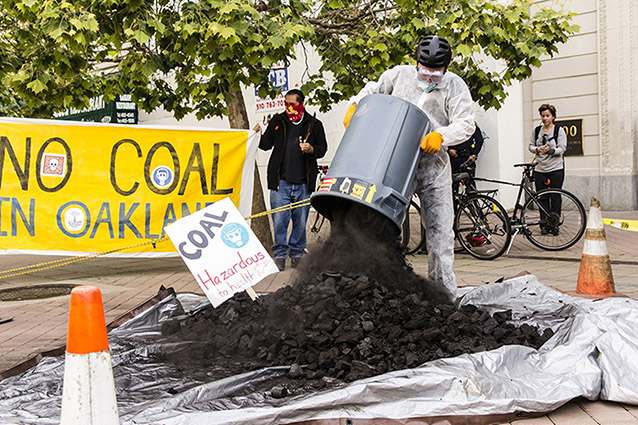from Against the Current
August 15, 2016
On July 19, the Oakland City Council voted unanimously to turn down the application for export of coal to Asia through a bulk commodities terminal under construction at the city’s port. This followed an earlier June 27 vote at a special council meeting. The developers of the proposed coal export facility–who were offered $53 million by Utah coal interests–are expected to sue. It’s an important victory for the residents of Oakland and the result of a popular mobilization. Under the developers’ plan, coal trains would have been rolling through town, spreading coal dust in already environmentally challenged communities.
Opposition to the coal export facility was organized for over a year by a coalition of environmental organizations, from the Sierra Club to System Change Not Climate Change. Hearings and demonstrations over the past year heard detailed testimony about health and safety issues. The coalition hammered away on the city’s obligation to enforce its laws on city-controlled land. Michael Rubin, a coalition activist and member of Solidarity’s Ecosocialist Working Group, explained to Against the Current that the property was turned over to the city by the federal government after the closure of an army base. The health issue, Rubin says, “is primarily the coal dust coming through Oakland, given the tonnage that was projected. That’s what we focused on and what the city council recognized as the health hazard.”

Photo by Steve Nadel.
According to the Sierra Club, a few years ago “the coal industry was eyeing at least six locations across the West Coast from which to ship coal to East Asia…a desperate, last-ditch effort to maintain market share as utilities back away from coal.” While a poll showed 76 percent of Oakland residents opposing the project, the Sierra Club reported, “(t)he dispute turned ugly when a shadowy group called Jobs 4 Oakland sent out a race-baiting mailer attempting to pit Oakland’s large African-American community against environmentalists.” The flyer, picturing white members of the Sierra Club Board of Directors, omitted the two African-American members including Club president Aaron Mair.
Michael Rubin told ATC that the coalition to stop the project was developed
“basically step by step, with a bunch of activists coming together. Even former mayor Jean Quan, the butcher of the Occupy movement here, actually spoke out on this issue. We met in the West Oakland Environmental Indicators Project office. WOEIP has worked to cut the high level of pollution in West Oakland.
“We were able to get a number of unions on board: the National Nurses Union, SEIU Local 1021, and also the Longshore Workers even though they were going to be getting the work. The longshore workers are primarily African American, and they know the long struggle trying to reduce the pollution load in West Oakland. The ships keep their engines running at the dock, which greatly increases pollution. We were able to turn around the Alameda Labor Council after a while, despite objections from the Teamsters and construction trades. The leadership wasn’t happy, but they fell into line with the prevailing sentiment.”
Unfortunately, coal and petcoke–a noxious byproduct of petroleum refining–are shipped from Richmond, California through the privately owned Levin-Richmond Terminal, which the city council opposes but is legally unable to stop. As much as 645 pounds of coal dust are believed to escape from each coal car in a 400-mile trip.
The energy giant Kinder Morgan, which is involved in the Richmond shipments, is also embroiled in bitter disputes with First Nations peoples in Canada over the company’s efforts to run oil pipelines through indigenous lands. It’s an international fight to protect local communities and the planet from capital’s forced march toward environmental disaster.
This article was prepared by the editors of Against the Current the Ecosocialist Working Group of Solidarity. For more background and further reporting, see this article from the Sierra Club. This article will appear in the September/October issue of Against the Current.
